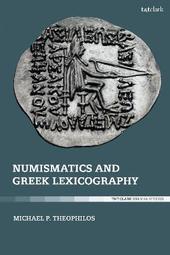
|
Numismatics and Greek Lexicography
Paperback / softback
Main Details
| Title |
Numismatics and Greek Lexicography
|
| Authors and Contributors |
By (author) Michael P. Theophilos
|
| Physical Properties |
| Format:Paperback / softback | | Pages:296 | | Dimensions(mm): Height 234,Width 156 |
|
| ISBN/Barcode |
9780567701978
|
| Classifications | Dewey:737.0938 |
|---|
| Audience | | Tertiary Education (US: College) | |
|---|
| Illustrations |
76 bw illus
|
|
Publishing Details |
| Publisher |
Bloomsbury Publishing PLC
|
| Imprint |
T.& T.Clark Ltd
|
| Publication Date |
29 July 2021 |
| Publication Country |
United Kingdom
|
Description
Michael P. Theophilos explores the fascinating variety of numismatic contributions to Greek lexicography, pertaining to lexicographic studies of the Second Temple period in general, and the New Testament in particular. Theophilos considers previous scholarly attempts to grapple with, and incorporate, critical numismatic material into the emerging discipline of Greek lexicography - including foundational work by F. Preisigke and E. Kiessling - before outlining his own methodological approach. Theophilos' then examines the resources available for engaging with the numismatic material, and presents a series of specific case studies throughout the New Testament material. His carefully annotated images of coins draw readers in to a greater understanding of the material culture of the Greco-Roman world, and how this impacted upon the Greek language and the New Testament.
Author Biography
Michael P. Theophilos is Associate Professor of Biblical Studies and Ancient Languages in the Faculty of Theology and Philosophy at the Australian Catholic University, Australia.
ReviewsSignificant ground-breaking books such as this are rare and the importance of this book cannot be overstated. It is clear, detailed, and correct in pointing out an unquestionable deficiency in New Testament lexicography making it an excellent book for anyone interested in biblical Greek. * Reading Religion * The methodological discussion has the potential to help shape the future of Greek lexicography and, especially, the tools upon which students and scholars rely. Theophilos's study is sure to leave an impression on the field. Scholars of the New Testament and early Christianity are in his debt. * Journal of Language, Culture, and Religion * 'Theophilos' invaluable, original and innovative research breaks new ground methodologically in bringing together the usually disparate specialties of numismatics, lexicography and New Testament studies. All three areas will substantially benefit from this scholarly, robust and up to date critical appraisal and the subsequent series of case studies. It is highly recommended for numismatists and Neutestamentler, and will extend lexicographers beyond their usual recourse to papyrology and epigraphy. * Alanna Nobbs, Macquarie University, Australia * In this eloquent volume, the author equips his reader to appreciate and to understand two long established and technical fields of study: numismatics and lexicography. New Testament scholars are encouraged to recognise not only the significant contribution that coin inscriptions can make to lexicography, but also how such insights into the Greek language might illuminate New Testament Texts. Theophilos combines a sophisticated approach with critical rigor and lucid accessibility. * Mary Marshall, Oxford University, UK * This book is an invaluable contribution to the field of New Testament vocabulary studies and lexicography, a "must read" for novices and specialists alike. It eruditely and amply exemplifies the shortcomings in our lexicons and translations, all of which combine to hinder our full understanding. Essential for improving this state of affairs is a focus on the wealth of non-literary evidence for the contemporary language, most of it not yet properly explored. Coins have been the most neglected; Theophilos remedies this gap, makes exciting a subject that at first sight might appear dry and inaccessible, and leads the way forward with further discoveries. * Anne Thompson, Cambridge University, the Cambridge Greek Lexicon Project, UK *
|